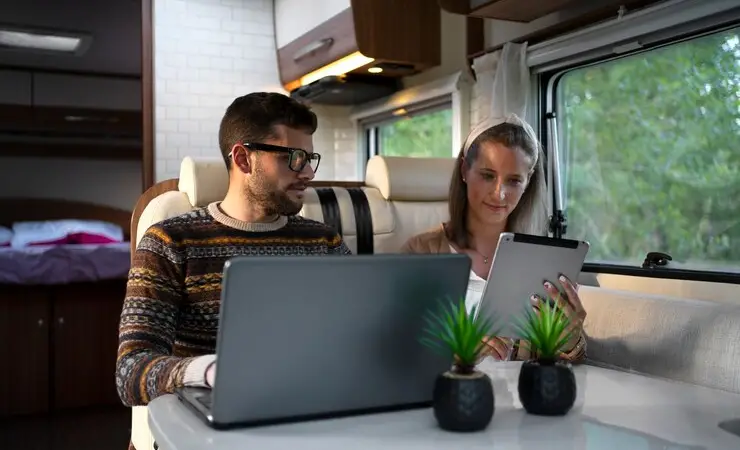The freedom to travel at one’s own pace and the draw of the open road have made recreational vehicles (RVs) very popular as a way to travel and even live full-time. People are interested in buying an RV because it gives them the chance to go on adventures and be flexible. Despite the excitement, many people wonder if getting an RV is a good investment. Finding the answer to this question requires looking at many things that might affect your choice and weighing the pros and cons of owning an RV.
The Appeal of RV Ownership
Before delving into the financial aspects, it’s crucial to understand why people are attracted to the idea of owning an RV. Here are some key reasons:
Freedom and Flexibility
With an RV, you can drive at your own pace, whether you’re going on a short weekend trip or a long vehicle-based vacation. You can alter your plans, visit new places, and have unforgettable moments along the way.
Comfort and Convenience
Kitchens, bathrooms, beds, and entertainment systems are just a few of the modern RV features that make them comparable to regular homes. Travelers can enjoy the pleasures of home while they’re on the road with this level of comfort and accessibility.
Cost Savings
For people who travel a lot, having an RV can save them money compared to more usual ways of traveling, like flying, staying in hotels, and eating out. Staying at campgrounds, RV parks, or even “boondocking” in rural areas can save you money on lodging costs if you have an RV.
Connection with Nature
People who like RVing can get close to nature and do things outside like hiking, swimming, and watching animals. A lot of RVers enjoy the chance to get away from the busy city life and get back in touch with nature.
Evaluating the Financial Considerations
Even though having an RV can improve your living in many ways, it’s important to think about the money side to see if it’s a good investment. Here are a few things to think about:
Initial Cost
The price of buying an RV upfront can vary a lot based on the type (motorhome, travel trailer, or fifth wheel), size, brand, and features. There are new RVs that cost tens of thousands to hundreds of thousands of dollars and used RVs that may be less expensive.
Depreciation
Not unlike cars, RVs lose value over time. Variables like age, condition, and market desire can change the rate of depreciation. Usually, the value of a new RV drops the most in the first few years of ownership. Older types may hold their value better, though.
Operating Costs
Having an RV comes with a lot of costs, like insurance, fixes, gas, camping fees, and storage. To get the full cost of ownership, you should add these costs. They can add up over time. Keep your RV in good shape if you want it to last as long as possible and cost as little to fix as possible.
Resale Value
Think about how much the RV might be worth again when you look at its long-term investment possibilities. Resale value can be affected by things like popularity, brand image, condition, and market trends. Some RVs that are well taken care of may keep their value pretty well, but others may lose a lot of value over time.
Frequency of Use
It depends on how often you use your RV to determine its general value and return on investment. Some people may get more value from their RV than someone who only uses it occasionally, whether they use it for trips, weekend getaways, or full-time living.
Assessing the Intangible Benefits
Aside from the financial aspects, it’s important to think about the non-monetary advantages of owning an RV, which might not have a clear monetary value but still add to your happiness and quality of life. Among these intangible perks are:
Quality Time with Family and Friends
RVing lets you spend valuable time with your family and friends, whether you’re cooking together, sharing meals, or going on outdoor adventures. These things that people do together can make relationships stronger and build memories that last a lifetime.
Adventure and Exploration
If you own an RV, you can go on a lot of exciting trips and explore new places. You can explore new places and learn about different cultures and scenery when you travel in an RV. This is true whether you’re going to national parks, beautiful beaches, or cute little towns.
Community and Camaraderie
People who live in RVs are known for their friendship and sense of community. RVers often become friends with other tourists, share advice and tips, and take part in activities and events as a group. This feeling of belonging can make RVing more fun and help people make connections that will last a lifetime.
Wrap It Up
Buying an RV may or may not be a good investment in the end, depending on your personal situation, objectives, and financial goals. Even if you don’t always make a lot of money from owning an RV, it can still give you important experiences, memories, and lifestyle benefits that make your life better in other ways. Before you decide, you should carefully think about your budget, how you like to travel, your ability to maintain the vehicle, and your long-term goals. Take the time to learn about the different kinds of RVs, look at their features and amenities, and compare prices from private sellers or reliable dealerships. You might want to rent an RV or go to RV shows and expos to get hands-on experience and learn from people who have already done this.

